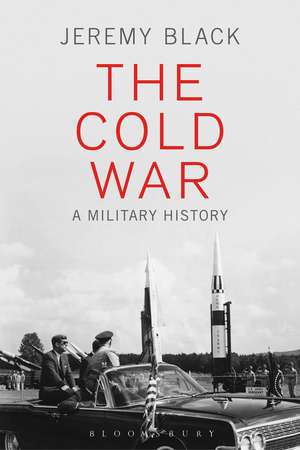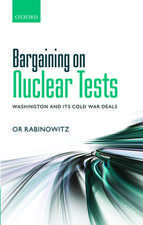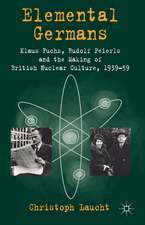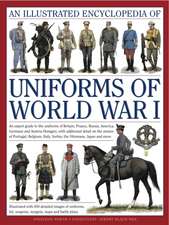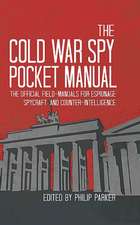The Cold War: A Military History
Autor Jeremy Blacken Limba Engleză Paperback – 21 oct 2015
| Toate formatele și edițiile | Preț | Express |
|---|---|---|
| Paperback (1) | 239.14 lei 6-8 săpt. | |
| Bloomsbury Publishing – 21 oct 2015 | 239.14 lei 6-8 săpt. | |
| Hardback (1) | 774.62 lei 6-8 săpt. | |
| Bloomsbury Publishing – 21 oct 2015 | 774.62 lei 6-8 săpt. |
Preț: 239.14 lei
Preț vechi: 273.49 lei
-13% Nou
Puncte Express: 359
Preț estimativ în valută:
45.77€ • 47.60$ • 37.78£
45.77€ • 47.60$ • 37.78£
Carte tipărită la comandă
Livrare economică 15-29 aprilie
Preluare comenzi: 021 569.72.76
Specificații
ISBN-13: 9781474217989
ISBN-10: 1474217982
Pagini: 280
Ilustrații: black & white illustrations
Dimensiuni: 156 x 234 x 15 mm
Greutate: 0.43 kg
Editura: Bloomsbury Publishing
Colecția Bloomsbury Academic
Locul publicării:London, United Kingdom
ISBN-10: 1474217982
Pagini: 280
Ilustrații: black & white illustrations
Dimensiuni: 156 x 234 x 15 mm
Greutate: 0.43 kg
Editura: Bloomsbury Publishing
Colecția Bloomsbury Academic
Locul publicării:London, United Kingdom
Caracteristici
Coverage begins in 1917, putting the Cold War in the context of the preceding two World Wars and early 20th-century diplomatic history
Notă biografică
Jeremy Black is Professor of history at the University of Exeter, UK and a Senior Fellow of the Foreign Policy Research Institute, USA. He has written widely on modern military and diplomatic history and his most recent publications include The Power of Knowledge (2013) and War in the Modern World (2014).
Cuprins
Preface1. 1917-392. 1939-453. 1945-534. 1953-685. 1968-796. 1979-857. 1985-928. PostscriptSelected BibliographyIndex
Recenzii
[A] wide-ranging historical account ... [T]his book provides readers who are unfamiliar with both the military and non-military aspects of the Cold War with a highly useful introduction.
A knowledgeable account of the Cold War based on the latest research literature . A book worth reading.
Serves as an important discussion of military history that does not disregard the global political framework of the era ... [The] impressive bibliography is of great assistance to those who wish to expand their reading and study of one issue or another that are discussed in the different chapters of the book. Therefore, this is a study that not only military historians should know and use; those who are researching the political and diplomatic history of the Cold War will also find it very interesting.
The Cold War, in many respects, defined the Twentieth Century. In this important book Jeremy Black illustrates the ways in which military issues and ideological conflict were intrinsically connected to one another. By showing how the confrontation of the post-1945 years had its roots in the Bolshevik Revolution and the Russian Civil War, he also succeeds in illuminating the causes of the East-West tensions that have returned to plague the world today. Written with insight and panache, this is a work of great erudition and genuine global reach.
Professor Black skillfully deploys his considerable expertise in military and diplomatic history and presents a concise narrative that demonstrates the complexity and global nature of the Cold War. This is a history of the superpower conflict and the crises that engulfed the Third World. From Black's emphasis on the Russian Civil War and the root causes of the ideological and geopolitical conflict of U.S. and U.S.S.R. to détente and proxy wars and to his argument about the fall of the Soviet Union as the result of a crisis of totalitarianism, this book is international history at its best.
Jeremy Black deftly analyzes the Cold War military struggles within the broader global context of domestic politics, foreign policy, economics, anti-colonialism, nationalism, geostrategy and ideology examining a long period of sustained hostility and "proxy wars" dating to the Russian Revolution of 1917. He evaluates not just the traditional US/NATO versus USSR//Warsaw Pact rivalry, rather, he expertly relates military conflict and violence to the more complex international dynamics that roiled empires, alliances, nation-states, and former colonies.
Jeremy Black's new book provides us with a thought-provoking and wide-ranging overview that highlights the nature of the Cold War as war. An impressive synthesis of research by a scholar at the peak of his powers.
A knowledgeable account of the Cold War based on the latest research literature . A book worth reading.
Serves as an important discussion of military history that does not disregard the global political framework of the era ... [The] impressive bibliography is of great assistance to those who wish to expand their reading and study of one issue or another that are discussed in the different chapters of the book. Therefore, this is a study that not only military historians should know and use; those who are researching the political and diplomatic history of the Cold War will also find it very interesting.
The Cold War, in many respects, defined the Twentieth Century. In this important book Jeremy Black illustrates the ways in which military issues and ideological conflict were intrinsically connected to one another. By showing how the confrontation of the post-1945 years had its roots in the Bolshevik Revolution and the Russian Civil War, he also succeeds in illuminating the causes of the East-West tensions that have returned to plague the world today. Written with insight and panache, this is a work of great erudition and genuine global reach.
Professor Black skillfully deploys his considerable expertise in military and diplomatic history and presents a concise narrative that demonstrates the complexity and global nature of the Cold War. This is a history of the superpower conflict and the crises that engulfed the Third World. From Black's emphasis on the Russian Civil War and the root causes of the ideological and geopolitical conflict of U.S. and U.S.S.R. to détente and proxy wars and to his argument about the fall of the Soviet Union as the result of a crisis of totalitarianism, this book is international history at its best.
Jeremy Black deftly analyzes the Cold War military struggles within the broader global context of domestic politics, foreign policy, economics, anti-colonialism, nationalism, geostrategy and ideology examining a long period of sustained hostility and "proxy wars" dating to the Russian Revolution of 1917. He evaluates not just the traditional US/NATO versus USSR//Warsaw Pact rivalry, rather, he expertly relates military conflict and violence to the more complex international dynamics that roiled empires, alliances, nation-states, and former colonies.
Jeremy Black's new book provides us with a thought-provoking and wide-ranging overview that highlights the nature of the Cold War as war. An impressive synthesis of research by a scholar at the peak of his powers.
